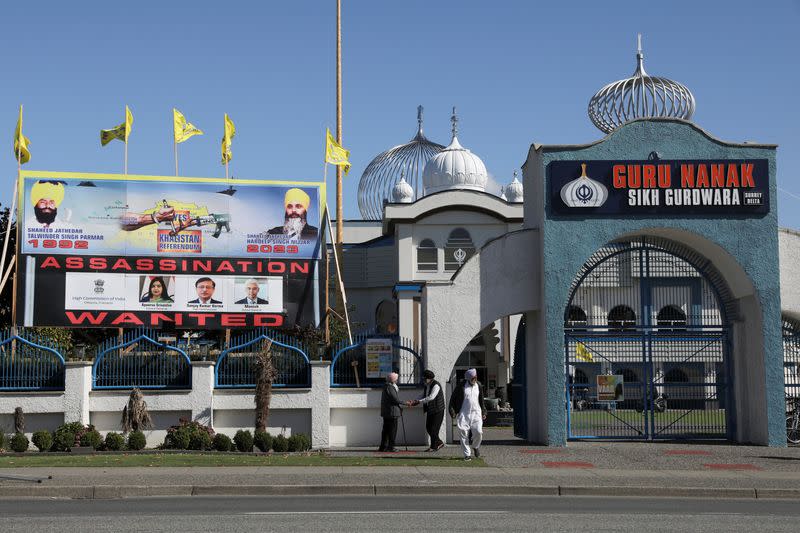Factbox-What is the Khalistan movement and why is it fuelling India-Canada rift?

By Rupam Jain and Shivam Patel
NEW DELHI (Reuters) - Tensions between India and Canada escalated after Canadian Prime Minister Justin Trudeau said on Monday there were "credible allegations" linking Indian government agents to the June murder in Canada of a Sikh separatist leader campaigning for the creation of an independent Sikh homeland called "Khalistan".
WHAT IS THE KHALISTAN MOVEMENT?
It wants an independent Sikh state carved out of India and dates back to India and Pakistan's independence in 1947 when the idea was pushed forward in negotiations preceding the partition of the Punjab region between the two new countries.
The Sikh religion was founded in Punjab in the late 15th century and currently has about 25 million followers worldwide. Sikhs form a majority of Punjab's population but are a minority in India, comprising 2% of its population of 1.4 billion.
Sikh separatists demand that their homeland Khalistan, meaning "the land of the pure", be created out of Punjab.
The demand has resurfaced many times, most prominently during a violent insurgency in the 1970s and 1980s which paralysed Punjab for over a decade.
HOW DID INDIA REACT?
The Khalistan movement is considered a security threat by the Indian government. The bloodiest episode in the conflict between the government and Sikh separatists occurred in 1984.
Then-Prime Minister Indira Gandhi sent the military into the Golden Temple, the holiest shrine for Sikhs, to evict armed separatist leader Sant Jarnail Singh Bhindranwale and his supporters, which infuriated Sikhs around the world.
A few months later, Gandhi was assassinated by her Sikh bodyguards at her home in New Delhi. The army launched operations in 1986 and 1988 to flush out Sikh militants from Punjab.
Sikh militants were also blamed for the 1985 bombing of an Air India Boeing 747 flying from Canada to India in which all 329 people on board were killed off the Irish coast.
The insurgency killed tens of thousands of people and Punjab still bears the scars of that violence.
Although the Khalistan movement has little support now in India, it has small pockets of backing among sections of the Sikh diaspora in Canada, which has the largest population of Sikhs outside Punjab, and in Britain, Australia and the U.S.
WHY IS INDIA WORRIED NOW?
In April this year, India arrested a self-styled preacher and Sikh separatist Amritpal Singh for allegedly reviving calls for Khalistan, sparking fears of new violence in Punjab.
Earlier this year, India hit out at Canada for allowing a float in a parade depicting the assassination of Indira Gandhi, perceiving this to be a glorification of Sikh separatist violence.
India has also been upset about frequent demonstrations and vandalism by Sikh separatists and their supporters at Indian diplomatic missions in Canada, Britain, the U.S. and Australia, and has sought better security from local governments.
HOW DOES IT IMPACT INDIAN-CANADIAN RELATIONS?
Indian diplomats based in Canada have on numerous occasions said that Ottawa's failure to tackle "Sikh extremism", and the constant harassment of Indian diplomats and officials by Khalistanis, is a major foreign policy stress point.
Indian Prime Minister Narendra Modi raised strong concerns about Sikh protests in Canada with Trudeau on the sidelines of a G20 summit in New Delhi this month.
Canada has paused talks on a proposed trade treaty with India. Canadian Trade Minister Mary Ng is postponing a planned trade mission to India.
(Reporting by Rupam Jain, Shivam Patel; Editing by YP Rajesh and Mark Heinrich)


